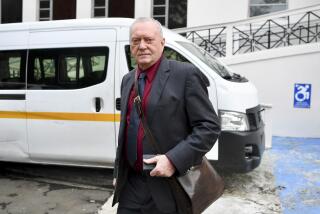Judge Asked to Toss Out Simon Verdict
- Share via
The investment firm of Republican gubernatorial candidate Bill Simon Jr. made a final push Tuesday to persuade a judge to toss aside a fraud verdict that has damaged his campaign.
At a Superior Court hearing in Los Angeles, Judge James C. Chalfant said he had reached his decision but would not make it public until Thursday.
A jury found in July that William E. Simon & Sons defrauded Paul Edward Hindelang in a deal to take control of his Van Nuys pay phone company, Pacific Coin.
Brad D. Brian, a lawyer for the Simon firm, told the judge Tuesday that there was insufficient evidence to support the verdict.
“The fact that a business deal did not work out does not make fraud,” Brian said.
But Hindelang’s lawyers asked Chalfant to uphold the verdict against the Simon firm and its partners. The jury levied $78 million in damages against the Simon firm and $19 million in damages against its partners.
“There is more than enough evidence of fraud by these people,” said Hindelang’s lawyer, Anthony C. Duffy.
Chalfant offered no clear sign of his decision.
For Simon, a first-time candidate who has marketed himself primarily as a successful businessman, the stakes are enormous. He was executive director of William E. Simon & Sons in 1998 when the firm invested in Pacific Coin. Court records show that he participated in every stage of the partnership.
On his personal income tax returns, Simon has declared more than $1.2 million in losses from the Pacific Coin investment.
Hindelang, Pacific Coin’s founder, is a convicted marijuana smuggler who served 30 months in prison during the 1980s. Simon has said he was unaware of Hindelang’s criminal background when his firm and its partners acquired a controlling stake in Pacific Coin.
The case has been a boon to Democratic incumbent Gray Davis, who has featured the fraud verdict in a television ad that asks, “Simon: If his partners can’t trust him, how can we trust him with the fifth largest economy in the world?”
On the stump, Simon has called himself the victim of a “crazy” verdict by a “runaway jury.” The 12 jurors were unanimous in finding the Simon firm liable for fraud.
The firm’s lawyers argued in court Tuesday that the misconduct in the case was by Hindelang. Namely, they said, he failed to disclose his criminal record to the Simon group. If he had, the Simon group would not have invested millions to take control of Pacific Coin, they said. Hindelang retained a minority interest in Pacific Coin after the Simon group took over.
“Because of his lies and fraudulent concealment, he caused my clients to part with millions of dollars,” Brian said.
Hindelang’s lawyers said the Simon group never asked if he had a criminal record. After 14 years as Pacific Coin’s chief executive, he had no obligation to volunteer the information, they said.
They also argued that the company’s collapse had nothing to do with Hindelang’s criminal history.
The essence of the fraud found by the jury is that the Simon group hid from Hindelang its plan to borrow huge sums of money to expand Pacific Coin--against his wishes--and then to take it public quickly in a stock offering.
The Simon firm’s lawyers assert that Hindelang knew of their plan all along. “Everybody knew that the long-term strategy of this company was to go public,” Brian said.
Ultimately, Pacific Coin was unable to repay what it borrowed to finance the expansion, so its lenders seized the company.
The stock offering, which never took place, would have generated the money to pay off the debt, along with a windfall for the Simon group, Hindelang and other investors in Pacific Coin.
“Sticking the public with that debt is another issue,” Duffy said. “But that’s the way these people operate.”
More to Read
Get the L.A. Times Politics newsletter
Deeply reported insights into legislation, politics and policy from Sacramento, Washington and beyond. In your inbox twice per week.
You may occasionally receive promotional content from the Los Angeles Times.











